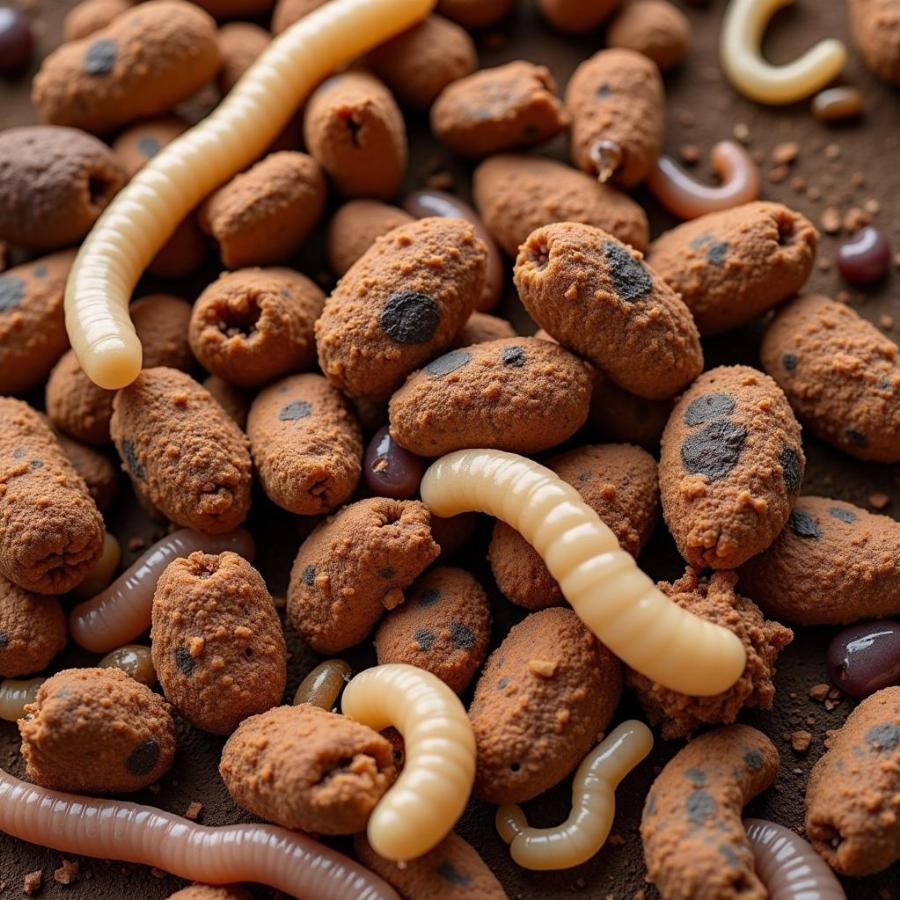Heartworms in dog poop is a common misconception. While you might worry about seeing worms in your dog’s feces, heartworms themselves are rarely found there. Understanding the heartworm life cycle and transmission is crucial for effectively protecting your furry friend. Let’s explore the facts about heartworms, their impact on your dog’s health, and how to ensure they stay safe.
Do Heartworms Show Up in Dog Feces?
The simple answer is no, heartworms are not typically found in dog poop. They reside in the heart and pulmonary arteries, making their presence in feces highly unlikely. What you might be seeing are other intestinal parasites, like roundworms, hookworms, whipworms, or tapeworms, which are commonly mistaken for heartworms. These intestinal parasites shed eggs or segments in the stool, making them visible to the naked eye. This is why regular fecal examinations by your veterinarian are so important.
 Dog Poop with Intestinal Parasites
Dog Poop with Intestinal Parasites
Understanding the Heartworm Life Cycle
Heartworms are transmitted through the bite of an infected mosquito. When a mosquito bites an infected dog, it ingests microscopic heartworm larvae called microfilariae. These larvae develop further within the mosquito and are then transmitted to another dog during a subsequent bite. The larvae migrate through the dog’s tissues and eventually mature into adult heartworms in the heart and lungs, where they can reproduce and cause significant damage.
Why Regular Vet Checkups are Crucial
While heartworms don’t appear in dog poop, regular veterinary checkups, including heartworm testing, are vital for early detection and treatment. Heartworm disease can be life-threatening if left untreated. Early diagnosis significantly improves the chances of successful treatment and minimizes long-term health complications.
Signs and Symptoms of Heartworm Infection
It’s important to be aware of the signs of heartworm infection in your dog, even though you won’t find the worms themselves in their stool. Early signs can be subtle and include a mild cough, decreased stamina, and reluctance to exercise. As the infection progresses, more severe symptoms can develop, such as difficulty breathing, coughing up blood, and weight loss. If you notice any of these symptoms, consult your veterinarian immediately. Knowing the symptoms dog has worms is important, even if those worms aren’t heartworms.
What does heartworm look like in a dog?
Adult heartworms resemble thin, spaghetti-like worms, but you won’t see them unless a veterinarian performs specialized tests.
Can I test my dog for heartworms at home?
While some at-home tests exist, it’s always best to consult with your veterinarian for accurate diagnosis and treatment recommendations.
How often should I test my dog for heartworms?
Annual testing is typically recommended, but your veterinarian may advise more frequent testing depending on your dog’s lifestyle and risk factors.
Preventing Heartworm Disease
Prevention is the best approach to protecting your dog from heartworms. Monthly heartworm preventatives are highly effective and available in various forms, including chewable tablets, topical medications, and injections. Talk to your veterinarian about the best preventative option for your dog. Remember, knowing how to know if dogs have worms and taking preventative measures are crucial for your pet’s wellbeing. A trip to a free dog park can be fun, but protecting your dog from parasites is crucial.
Conclusion
Heartworms in dog poop is a myth. While seeing worms in your dog’s stool is concerning and warrants a vet visit, it’s unlikely to be heartworms. Understanding the heartworm life cycle and focusing on prevention are key to protecting your dog from this potentially devastating disease. Regular vet checkups and heartworm preventatives are the best ways to ensure your furry friend stays healthy and happy.
FAQs about Heartworms
- Can humans get heartworms? While extremely rare, humans can be accidental hosts for heartworms.
- Are heartworms contagious between dogs? No, heartworms are not directly contagious from one dog to another.
- How long does it take for heartworms to mature? It takes approximately six months for heartworm larvae to mature into adult worms.
- Can heartworms be cured? Yes, heartworm disease is treatable, but the treatment can be lengthy and expensive.
- Are all dogs at risk for heartworms? Yes, all dogs are susceptible to heartworm infection, regardless of breed or lifestyle.
- How much does heartworm treatment cost? The cost of heartworm treatment can vary depending on the severity of the infection and the veterinarian.
- What are the long-term effects of heartworm disease? Even after successful treatment, heartworm disease can cause lasting damage to the heart and lungs.
Further Exploration
Are you interested in learning more about other types of worms that can affect dogs? Visit our other articles on intestinal parasites and their treatment options.
Beaut Dogs is your trusted source for all things dog-related. We offer comprehensive information, expert advice, and a passionate community of dog lovers. For personalized guidance on any dog-related questions, from breed information to health concerns, contact us at [email protected]. Beaut Dogs is here to help you navigate the wonderful world of canine companionship. Visit us at https://beautdogs.com today!